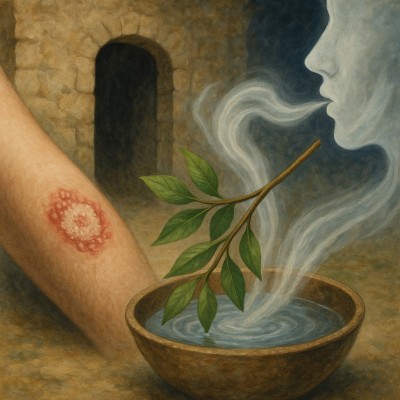
Parashat Tazria discusses the laws of ritual impurity caused by childbirth and the conditions surrounding tzaraas (commonly translated as “leprosy”), which manifests as skin changes or lesions. The Torah lays out a detailed process of diagnosis for tzaraas, with the Kohen playing a critical role. The Kohen is not acting as a medical doctor, but rather as a spiritual guide, discerning whether the lesions are a sign of ritual impurity.
According to Jewish law, these spots on the skin must meet specific criteria in color and size to be deemed unclean. Once identified, the person is quarantined for a period of time, with the Kohen making periodic checks. If the lesions improve, the person is declared clean, but if the condition worsens, the individual is isolated.
The underlying question arises: why does the Torah mention tzaraas in this context, and what is its significance? The Talmud (Arachin 16a) connects tzaraas to various sins, most notably lashon hara (gossip). Rabbi Shmuel ben Nachmani teaches that the disease results from gossip, bloodshed, false oaths, and other moral failures. The appearance of tzaraas is not merely a physical condition; it is a spiritual sign from G-d. The person afflicted must undergo a process of repentance, and through purification, they can re-enter the community, symbolizing both physical and spiritual healing.
The Maggid of Dubno, Rabbi Yaakov Krantz, tells a parable to explain the laws of tzaraas. A certain naughty boy hated guests. As soon as someone entered the house, the boy would throw a tantrum, fall on the floor, kick his feet, scream, and shout, crying, “I don’t want that person to be here! Make him go away!” What to do? The boy’s father thought for a while until he found a solution. Before the guests arrived, he would take his son to the woodshed and lock him up for as long as the guests were in the house. And this is what the father told his son: “You are one, but there are several people in the house. We cannot allow one person to keep our guests from entering our house….”
The same is done with a person who, through lashon hora, interferes with the lives of others. The gossiper becomes the reason acquaintances stop greeting each other, husbands and wives are divorced, innocent workers lose their jobs, and so on. It is obvious that it is better for both society and the gossiper if he is kept away from other people.
Each one of us must be aware of this. We all like to make others laugh or to bring attention to ourselves at someone else’s expense; those who work in the press, radio, or television are especially well-practiced in this. It costs them nothing to bring someone’s personal or private problems before the widest audience. I know of more than one case when conscientious employees were fired because of an article or broadcast on radio or television, where lives were ruined owing to someone taking it into his head to publicize things that happened in someone else’s house. Newspaper gossip has long been a nuisance.
By Rabbi Yitzchok Zilber, zt”l,
Founder, LaMaalot Foundation
Parashat Tazria: The Spiritual Significance Of Tzaraas & Purification
Typography
- Smaller Small Medium Big Bigger
- Default Helvetica Segoe Georgia Times
- Reading Mode




